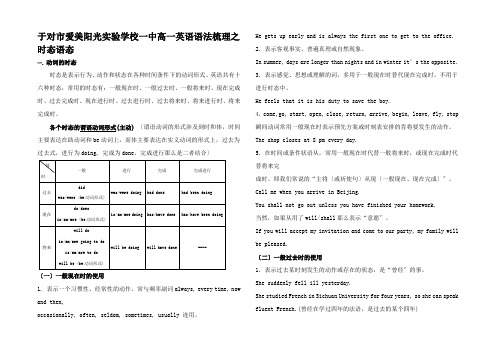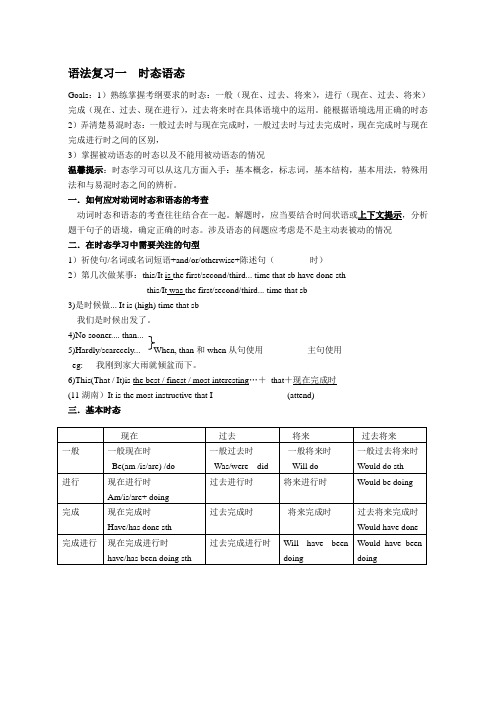语法集训过关时态语态(一)
高考英语总复习语法突破精练(1) 时态和语态

典题示例 By the time he realizes he ________ into a trap, it'll be too late for him to do anything about it. A.walks C.has walked B.walked D.had walked
剖析:C
时态
基本概念
特殊用法 ①go, come, leave, start等表示趋向的动词用进行时表 示按计划或安排将要发生的动作或状态。
①此刻正 ②与always, constantly, continually, all the time等连 现在 进行 时 在发生的 用,表示赞叹、赞许、表扬、抱怨、厌恶等情绪。 动作 ③表示相对静止的状态动词和感官动词等一般不可用
剖析:B
在语境中考查过去进行时的用法。过去进
行时主要表示过去某一时刻或某段时间里正在发生的动 作。刚才我没看见穿黑衣服的人,因为当时我在看报纸。
(3)一般过去时与现在完成时的区别 ①一般过去时所表示的过去时间是具体确定的,与其 他时间没有牵连,即它所表示的事情纯属过去,与现 在情况没有联系。 ②现在完成时所表示的事情与现在有关系,对现在造 成影响和结果。
1.几种基本时态
时态 基本概念 表示经常性、 一般现在时 习惯性动作和 现在的状态、 特征 特殊用法 用在时间或条件状语从句中, 以及谈论按计划或时间表安排 的活动时,表示将来。
时态
基本概念
特殊用法
①过去某个时间 ①在语境中,往往表示“刚 里发生的动作或 才,在过去”之意,暗示现 一般过去时 状态 在已“不再这样”。
太大,所以应回答目前正在发生的动作,具有暂时性,因 此用现在进行时。
动词时态语态笔记完整版(1)

一、一般现在时:概念:经常、反复发生的动作或行为及现在的某种状况。
时间状语:always, usually, often, sometimes, every week (day, year, month…), once a week, on Sundays, etc.基本结构:①be动词;②行为动词否定形式:①am/is/are+not;②此时态的谓语动词若为行为动词,则在其前加don‘t,如主语为第三人称单数,则用doesn't,同时还原行为动词。
一般疑问句:①把be动词放于句首;②用助动词do提问,如主语为第三人称单数,则用does,同时,还原行为动词。
例句:Do you often go shopping on Sundays?Does Tom usually have lunch at school?Are you a middle school student?Yes, I am.I don’t think you are right.Mary likes bread a lot, but she doesn’t like noodles at all. 1)表示事物长期的状态、性质e.g. I am a student.He knows a lot of English.2) 表示经常的或习惯的动作e.g. He always helps others.The old man goes to the park every morning.I get up early every day.3) 表示客观事实或普遍真理e.g. The sun rises in the east.October 1 is our National Day.二、一般过去时:概念:过去某个时间里发生的动作或状态;过去习惯性、经常性的动作、行为。
时间状语:ago, yesterday, the day before yesterday, last week(year, night, month…), in 1989, just now, at the age of 5, one day, long long ago, once upon a time, etc.基本结构:①be动词的过去式;②行为动词的过去式否定形式:①was/were+not; ②在行为动词前加didn‘t,同时还原行为动词。
语法练习语态时态和语气

语法练习语态时态和语气语法练习:语态、时态和语气语法中的语态、时态和语气是我们编写准确、流畅的句子所必须掌握的重要要素。
正确运用这些语法规则,可以使我们的表达更加清晰、准确。
本文将对语态、时态和语气进行分析和练习。
一、语态(Voice)语态是表示动作的主语与谓语动词之间的关系,典型的语态有主动态和被动态。
1. 主动态(Active Voice):强调主语执行动作。
例句:Tom eats an apple.(汤姆吃了一个苹果。
)2. 被动态(Passive Voice):强调动作的承受者。
例句:The apple is eaten by Tom.(苹果被汤姆吃了。
)练习:将下列主动态句子改写为被动态。
1. She opened the window.2. They built a new house.3. He will finish the work tomorrow.答案:1. The window was opened by her.2. A new house was built by them.3. The work will be finished by him tomorrow.二、时态(Tense)时态是表示动作发生的时间,常见的时态有一般现在时、一般过去时、一般将来时等。
1. 一般现在时(Simple Present):表示经常性或普遍性的动作或状态。
例句:She works in a hospital.(她在医院工作。
)2. 一般过去时(Simple Past):表示过去发生的动作或状态。
例句:I studied English last night.(昨晚我学英语了。
)3. 一般将来时(Simple Future):表示将来发生的动作或状态。
例句:We will visit our grandparents next month.(下个月我们将去拜访祖父母。
)练习:将下列句子改写为对应时态。
动词时态语态笔记完整版(1)

一、一般现在时:概念:经常、反复发生的动作或行为及现在的某种状况。
时间状语:always, usually, often, sometimes, every week (day, year, month…), once a week, on Sundays, etc.基本结构:①be动词;②行为动词否定形式:①am/is/are+not;②此时态的谓语动词若为行为动词,则在其前加don‘t,如主语为第三人称单数,则用doesn't,同时还原行为动词。
一般疑问句:①把be动词放于句首;②用助动词do提问,如主语为第三人称单数,则用does,同时,还原行为动词。
例句:Do you often go shopping on Sundays?Does Tom usually have lunch at school?Are you a middle school student?Yes, I am.I don’t think you are right.Mary likes bread a lot, but she doesn’t like noodles at all. 1)表示事物长期的状态、性质e.g. I am a student.He knows a lot of English.2) 表示经常的或习惯的动作e.g. He always helps others.The old man goes to the park every morning.I get up early every day.3) 表示客观事实或普遍真理e.g. The sun rises in the east.October 1 is our National Day.二、一般过去时:概念:过去某个时间里发生的动作或状态;过去习惯性、经常性的动作、行为。
时间状语:ago, yesterday, the day before yesterday, last week(year, night, month…), in 1989, just now, at the age of 5, one day, long long ago, once upon a time, etc.基本结构:①be动词的过去式;②行为动词的过去式否定形式:①was/were+not; ②在行为动词前加didn‘t,同时还原行为动词。
高一英语语法梳理之时态语态

于对市爱美阳光实验学校一中高一英语语法梳理之时态语态一.动词的时态时态是表示行为、动作和状态在各种时间条件下的动词形式。
英语共有十六种时态,常用的时态有:一般现在时、一般过去时、一般将来时、现在完成时、过去完成时、现在进行时、过去进行时、过去将来时、将来进行时、将来完成时。
各个时态的谓语动词形式(主动) 〔谓语动词的形式涉及到时和体,时间主要表达在助动词和be动词上,而体主要表达在实义动词的形式上,过去为过去式,进行为doing, 完成为done,完成进行那么是二者结合〕〔一〕一般现在时的使用1. 表示一个习惯性、经常性的动作。
常与频率副词always, every time, now and then,occasionally, often, seldom, sometimes, usually 连用。
He gets up early and is always the first one to get to the office. 2. 表示客观事实、普遍真理或自然现象。
In summer, days are longer than nights and in winter it’s the opposite.3. 表示感觉、思想或理解的词,多用于一般现在时替代现在完成时,不用于进行时态中。
He feels that it is his duty to save the boy.4. come,go, start, open, close, return, arrive, begin, leave, fly, stop 瞬间动词常用一般现在时表示预先方案或时刻表安排的肯将要发生的动作。
The shop closes at 8 pm every day.5. 在时间或条件状语从,常用一般现在时代替一般将来时,或现在完成时代替将来完成时。
即我们常说的“主将〔或祈使句〕从现〔一般现在、现在完成〕〞。
语法复习一 时态语态

语法复习一时态语态Goals:1)熟练掌握考纲要求的时态:一般(现在、过去、将来),进行(现在、过去、将来)完成(现在、过去、现在进行),过去将来时在具体语境中的运用。
能根据语境选用正确的时态2)弄清楚易混时态:一般过去时与现在完成时,一般过去时与过去完成时,现在完成时与现在完成进行时之间的区别,3)掌握被动语态的时态以及不能用被动语态的情况温馨提示:时态学习可以从这几方面入手:基本概念,标志词,基本结构,基本用法,特殊用法和与易混时态之间的辨析。
一.如何应对动词时态和语态的考查动词时态和语态的考查往往结合在一起。
解题时,应当要结合时间状语或上下文提示,分析题干句子的语境,确定正确的时态。
涉及语态的问题应考虑是不是主动表被动的情况二.在时态学习中需要关注的句型1)祈使句/名词或名词短语+and/or/otherwise+陈述句(________时)2)第几次做某事:this/It is the first/second/third... time that sb have done sththis/It was the first/second/third... time that sb_________3)是时候做... It is (high) time that sb_______________________我们是时候出发了。
________________________________________4)No sooner.... than...5)Hardly/scarecely... When, than和when从句使用__________主句使用____________eg: 我刚到家大雨就倾盆而下。
_______________________________________6)This(That / It)is the best / finest / most interesting…+that+现在完成时(11湖南)It is the most instructive that I ________________ (attend)三.基本时态现在过去将来过去将来一般一般现在时Be(am /is/are) /do 一般过去时Was/were did一般将来时Will do一般过去将来时Would do sth进行现在进行时Am/is/are+ doing 过去进行时____________将来进行时____________Would be doing完成现在完成时Have/has done sth 过去完成时____________将来完成时____________过去将来完成时Would have done完成进行现在完成进行时have/has been doing sth 过去完成进行时____________Will have beendoingWould have beendoing一).一般体主动结构:be(am/is/are)/ doA. 一般现在时被动结构:____________特殊用法:一般现在时表示将来1.主将从现:在时间(when/before/until/as soon as/the moment/once)、条件(if/unless/even if)、让步状语(no matter+疑问词、疑问词+ever)从句中,如果主句中的动词用一般将来时,从句中的动词通常用一般现在时,而不用将来时态。
时态与语态(英语语法)
时态与语态(一)动词时态的典型用法1、一般现在时①在表示客观事实或普遍真理的含义时不受时态的限制,均用一般现在时。
②在表示按时间表拟定好的事情或要发生的动作,句中常有表将来的时间状语,但句子用一般现在时。
③在某些习惯表达中,常用一般现在时表示已经发生的动作或存在的状态。
2、一般过去时①如果从句中有一个表示过去的时间状语,尽管从句中的动作先于主句发生,但从句中的谓语动词仍用一般过去时。
②U sed to do也表示“过去常常做某事”(暗含现在没有这个习惯了)注意:be used to doing表示“习惯于”,该短语中to为介词,后接名词或动名词作宾语。
①在表示“没有认出/想出/想起”等句型中,常用一般过去时。
3、一般将来时在if,unless,even if等引导的状语从句中,如果主句是将来时,从句仍用现在时表示。
4、现在进行时现在进行时不仅可以表示正在进行的动作,还可以表示说话人厌恶、喜欢、惊讶的情绪。
注意:英语中有部分动词是不能用于进行时态的,该类动词有:表示时态Seem,look,appear,have,belong to,own表示知道、信念、理解、知识、推测、希望Know,forgot,remember,understand,see,think,believe,suppose,hope表示要求、希望、心态Want, wish,need,desire表示一时动作Accept,allow,admit,decide,complete表示衡量Measure,weigh,value,cost,number5、过去进行时表示从过去某一时间的角度看将要发生的动作,仅限于come,go,start,leave,stay,arrive等词Were/was going to结构常表示过去未能实现的计划或打算。
(二)、一般将来时的多种表达方式1、be going to结构在口语中常用来表示已经决定或安排要做的事情,或必然或很有可能发生的事情,也可用来表示自然现象。
高中语法复习-动词时态及语态
(二)动词的语态 熟读深思
熟读下列被动句,体会被动语态的用法;观察谓 语部分,思考各种时态被动语态的构成。 1.The G8 is made up of political leaders
from... 2.The Group of Eight,or G8,was formed by
eight of the world’s wealthiest nations in 1998. 3.The news is being celebrated by crowds in the streets.
部电影了。(暗示我已知道电影的内容了)
10.She has been a dancer for ten years.她已 当了十年的舞蹈演员了。(从过去到现在)
11.When the police arrived,the thieves had run away.警察到达时,小偷们早就跑了。
12.When Jack arrived he learned Mary had been away for almost an hour.当杰克到来 时,他才了解到玛丽已经离开差不多一个小时 了。
6.I’m studying at an evening school.我在上 夜校。(现阶段)
7.She’s always helping people.她总是帮助别 人。(赞扬)
8.I knew you would agree.我知道你会同意的。 9.I have seen the film already.我已经看过那
6.London’s name had been announced twice before.
7.It is going to be remembered as a historical meeting this year,as the topic of Africa will be discussed in detail.
2021届高考英语一轮语法训练: 时态、语态(含答案解析)
语法对点讲练一时态、语态一、现在时态学问点讲解1.一般现在时①表示经常性的或习惯性的动作、状态、性能等。
常与表示频度的时间状语always, seldom, often, sometimes, every day, once a week等连用。
②表示客观真理、格言以及不受时间限制的客观存在。
The earth moves around the sun.③在时间、条件、让步状语从句中用一般现在时表示将来时,主句多用一般将来时。
④表示按时间表、方案、规定发生的动作。
2.现在进行时⑤表示说话时正在进行的动作或存在的状态。
⑥表示现阶段正在进行的动作或发生的事情。
⑦与always, constantly, frequently, continually, forever, all the time等连用,表示赞美、赞扬、厌恶、不满等情感。
⑧come, go, start, open, close, arrive, return, begin, leave等动词用于进行时,表示按方案、支配即将发生的动作。
⑨不用于进行时态的动词:表示存在的动词:stay, remain, keep, contain等。
表示全部的动词:have, belong to, own, hold, possess等。
表示感观的动词:look, seem, appear, taste, feel, sound等。
表示情感的动词:love, like, prefer, hate等。
表示思想、信念的动词:think (认为), consider (认为), believe, trust, guess, wonder, forget, know, understand, realize, suppose, agree等。
3.现在完成时⑩表示过去的动作或事情对现在的影响或结果,常用的时间状语有:recently, lately, before, yet, ever, never, once, just等。
2019版高考英语一轮复习语法专项专题四动词的时态和语态(一)课件北师大版---89页
四、现在完成进行时 1.表示动作从过去某时开始一直持续到现在,并有可能持续下时、现在 完成时、现在完成进行时)
——考题尝试(单句语法填空)
1.(2017·北京高考改编) People have (have) better access to health care than they used to, and they're living longer as a result.
2.(2016·6 月浙江高考改编)While online shopping has changed (change) our life, not all of its effects have been positive.
3.—Excuse me, which movie are you waiting for? —The new Star Wars. We have been waiting (wait) here for more than two hours.
4.表示两个紧接着发生的动作,常由以下词语连接,用一般 过去时。常见的连接词有 but, and, when, as soon as, immediately, the moment, the minute。 The moment she came in, she told me what had happened to her. 她一进来就告诉我她发生了什么。
二、过去进行时 1.过去进行时的主要用法是描述一件事发生的背景;一个动作
- 1、下载文档前请自行甄别文档内容的完整性,平台不提供额外的编辑、内容补充、找答案等附加服务。
- 2、"仅部分预览"的文档,不可在线预览部分如存在完整性等问题,可反馈申请退款(可完整预览的文档不适用该条件!)。
- 3、如文档侵犯您的权益,请联系客服反馈,我们会尽快为您处理(人工客服工作时间:9:00-18:30)。
语法集训过关(一)时态和语态老师叮咛:李辉老师说,所谓聪明都是小聪明,而真正的智慧呢,就是能够学会去发现各种规律,君子性非异也,善假于各种规律也。无论我们学了多少知识,只是我们知道的,能否成为自己的就看联系,下面有关时态语态的练习非常重要,经过了全网首席高考英语名师李辉老师团队高度认真地整理校对、无错、可信!可供全国各省高中生打印、背诵!Ⅰ. 完成句子1. (2014·武汉模拟)He has been suspected of taking government funds for himself and by the police. ( investigate )他已被怀疑挪用政府资金,正在接受警方调查。
答案:is being investigated2. (2014·襄阳模拟)I suppose by the time I come back in ten years’ time all these old houses . (pull)我想十年以后我回来时,所有这些老房子都会被拆除了。
答案:will have been pulled down3. (2014·黄石模拟)In the past two years, some modern teaching equipment as well as hundreds of computers schools in the rural areas. (send)在过去的两年里,一些现代化的教学设施和成百上千台电脑已经被送到了乡村地区的学校。
答案:has been sent to4. It is reported that another landmark building in the east of Wuhan by the end of 2014. (set)据报道,另一座地标式建筑将于2014年年底在武汉东部建起。
答案:will have been set up5. Scientists the cure for AIDS for the last 20 years. (explore)在过去的二十年里,科学家们一直在探索治愈艾滋病的方法。
答案:have been exploring6. We are designing an experiment to find out if glass when it is cold. (break)我们正在设计一个实验, 想弄清楚当天冷时, 玻璃是否更容易破裂。答案:breaks more easily/is easier to break7. I was struck by its beauty and romance the first time I France. (foot)我初次踏上法国的国土时,就被它的美丽和浪漫打动了。
答案:set foot in8. The reason why he is so happy today is that he has finally got the toy car that . (expect)他今天很高兴的原因是他终于得到了他一直期盼的玩具小汽车。
答案:he has been expecting9. By the time he retired, George enough money to buy a holiday home. (save)到乔治退休时,他已攒够了买度假屋的钱。
答案:had saved10. By the time we take the 2014 College Entrance Exam, we more than 3, 500 words. (master)到我们参加2014年高考时,我们将会掌握3 500多个单词。
答案:will have mastered11. As reliable parents, they never give their son what they have promised. (fail)作为可信赖的父母,他们从不食言给儿子他们已经答应过的东西。
答案:fail to12. In the last few years, the independent recruitment exams the chances of top students being admitted by famous universities. (increase)在过去的几年里,自主招生考试增加了优秀学生被名校录取的机会。
答案:have increased13. I there when the traffic accident occurred. (happen)车祸发生时,我碰巧在那儿。
答案:happened to be14. By the time he , I will have finished the book. (come)到他回来时,我将已完成这本书了。
答案:comes back15. By the end of 2013, the American mother 13 countries and met 90% of her Facebook friends. (travel)到2013年年底,这位美国妈妈已到过13个国家,与她在脸谱网上的90%的朋友见了面。
答案:had travel(l)ed to16. Professor Smith keeps telling his students that the future the well-educated. (belong)史密斯教授不断地告诉他的学生,未来属于那些受过良好教育的人。
答案:belongs to17. It was in the city where he that he received his compulsory education. (live)他是在那个他曾经住过的城市接受的义务教育。
答案:once lived18. Our boss a raise in salary for ages, but nothing has happened yet. ( promise )我们老板一直许诺加薪好多年了,可到现在什么动静也没有。
答案:has been promising (us)19. A man can fail many times, but he isn’t a failure until he somebody else. (blame)一个人可以失败很多次,但是只要他没有开始责怪别人,那他就还不是一个失败者。答案:begins/starts to blame20. The stolen historical relics of the Imperial Palace priceless. (report)据报道, 故宫被盗走的那些文物价值连城。答案:are reported to beⅠ. 完形填空When I started riding a bike a couple of years ago, I didn’t think my involvement would ever be more serious than the occasional short ride. But as I built strength, my friends 1 me to step up my training and try some longer trips. The first one to come along was a 150-mile trip, the MS-150, an annual 2 that raises money to fight AIDS.When I registered, the idea seemed fantastic—support a worthy cause while going for the distance and I trained with 3 . However, as the time for the ride approached, my self-doubts 4 beyond my endurance(忍耐). I 5 wanted to raise money for the charity, but I didn’t really want to bike all those miles for two days straight.The ride began on a beautiful Sunday morning in the Georgia countryside, and for the first few hours I felt 6 . This was just the experience I had 7 , and my spirits were high. 8 by the end of the day, I felt tired out.If the body is 9 to the mind, here was evidence. Every 10 my brain pushed out seemed to travel right down to my legs. “I can’t handle this” became a leg cramp(抽筋), and “everyone else is a better rider” translated into 11 of breath. I was sure I’d have to 12 .As I topped the crest(顶)of a hill, the beautiful sunset kept me going for a few minutes more. Thenin the distance, I saw a lone woman riding very slowly 13 the bright red sun. I 14 that the person looked different in some way, but I couldn’t tell why. So I pushed myself to 15 . There she was riding along slowly but 16 , with a slight and determined smile on her face and she had only one leg.My focus changed in that instant. For a whole day I’d been 17 my body. But now I knew it wasn’t the body, but the 18 that would help me reach my goal.It rained all the second day. I never saw the one-legged biker again, but I pushed on without 19 , knowing she was out there with me somewhere. And at the end of the day, still feeling 20 , I completed the 150-mile trip.【文章大意】作者讲述了自己参加每年一次为抗击艾滋病筹款骑自行车活动的经历。1. A. encouraged B. forbade C. forced D. warned【解析】选A逻辑推理题。朋友当然是“鼓励”而非“强迫”或“警告”。2. A. accident B. event C. incident D. affair【解析】选B词语辨析题。an annual event每年一次的活动。event“重大事件, 赛事”; accident“意外事故”; incident“事端, 小事件”; affair“事情, 事务”。3. A. care B. easeC. enthusiasmD. difficulty【解析】选C逻辑推理题。开始作者充满激情地训练。enthusiasm“热心, 热情”; care“关心, 喜欢”; ease“安逸”; difficulty“困难”。4. A. achieved B. gainedC. progressedD. advanced【解析】选B词语辨析题。achieve“完成, 达到”; gain“(逐渐)增加, 获得”; progress“进步”; advance“前进, 进步”。句意: 随着时间的临近, 我对自己能力的怀疑逐渐增加。5. A. still B. even C. rather D. then【解析】选A逻辑推理题。still仍然。6. A. nervous B. disappointedC. wonderfulD. refreshed【解析】选C逻辑推理题。I felt wonderful. 作者开始感觉很好。后面my spirits were high是提示。7. A. suspected B. appreciatedC. admiredD. imagined【解析】选D词语辨析题。这种经历是作者之前想象的。suspect“怀疑”; appreciate“欣赏”; admire“钦佩”。8. A. But B. ThereforeC. MeanwhileD. Moreover【解析】选A逻辑推理题。根据后面I felt tired out可知这里是转折。9. A. opposite B. connected C. exposed D. equal【解析】选B背景常识题。身体与大脑是有联系的。10. A. cause B. reason C. excuse D. effect【解析】选C词语辨析题。由于作者想放弃所以大脑给出各种借口, 所以选excuse, 而reason是原因的意思, 故排除。11. A. state B. conditionC. matterD. shortness【解析】选D固定搭配题。shortness of breath“呼吸困难; 上气不接下气”。12. A. quit B. continue C. insist D. fade【解析】选A逻辑推理题。作者在前面说I can’t handle this所以这里他认为自己不得不放弃。quit“停止, 放弃”; continue“继续”; insist“坚持”; fade“衰退, 退色”。13. A. on B. against C. down D. over【解析】选B固定搭配题。against“以……为背景, 以……作衬托”。例如: against the evening sky在夜空的衬托下。作者这里用烈日来衬托这个一条腿妇女的不寻常之处。14. A. observed B. watchedC. noticedD. overlooked【解析】选C词语辨析题。作者后面说“说不出为什么”这里只是“注意”到有所不同比较合适。observe 表示仔细观察, 多用于科学实验等。watch表示用心观看、盯着看, 多用于日常生活。overlook“忽略; 俯视”。15. A. put up B. look up C. catch up D. take up【解析】选C词语辨析题。作者说不清什么地方不同所以“赶上去(弄明白)”。catch up“赶上”; put up“搭建, 张贴”; look up“抬头看, 查看”; take up“从事, 占据”。16. A. steadily B. abruptlyC. CloselyD. narrowly【解析】选A前后照应题。steadily“平稳地, 从容地”。她骑得缓慢但很“稳定”与后面面带轻松且坚定的微笑相符。17. A. trusting B. doubtingC. cheatingD. fighting【解析】选B词汇复现题。从前面可知作者一直对自己(身体)能否坚持骑下去持怀疑态度, 所以这里用一整天都在怀疑最合适。18. A. strength B. honesty C. will D. power【解析】选C逻辑推理题。之前一直怀疑自己的身体, 但现在从这个残疾女车手身上明白了“意志力”才是实现目标的关键。19. A. struggling B. arguingC. negotiatingD. complaining【解析】选D逻辑推理题。在受到激励启发之后作者的思想起了很大变化, 当然不再“抱怨”。20. A. strong B. weakC. healthyD. spiritless【解析】选A逻辑推理题。由于思想上起了变化, 作者到最后仍感到浑身有力。。
